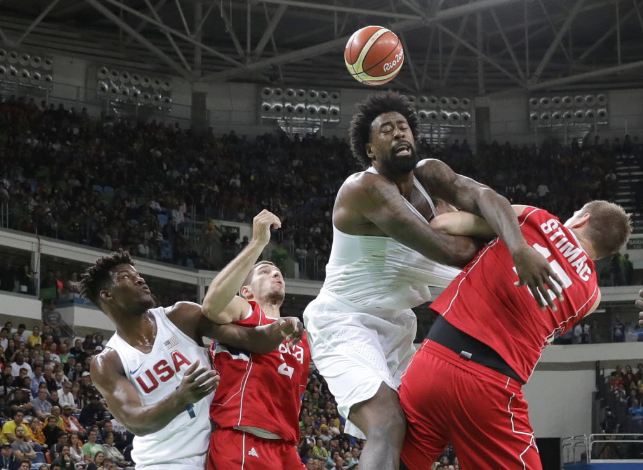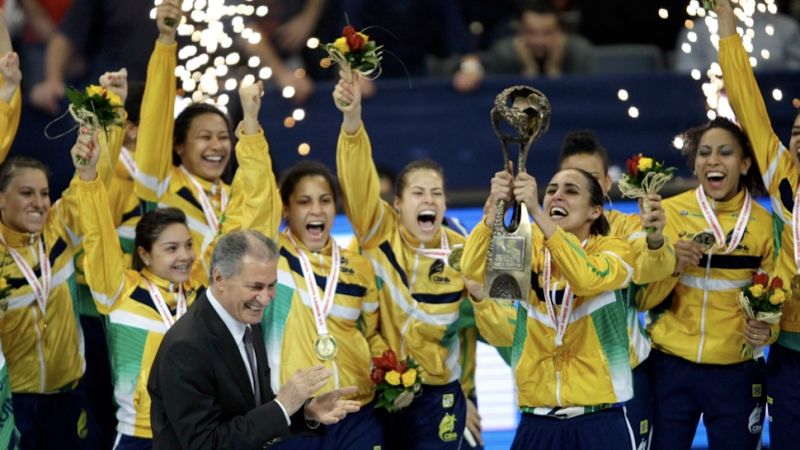
The Serbian basketball (with just 1 NBA player) lost narrowly yesterday to Team USA in Group play 94-91. What’s the difference athleticism wise between the Serbian Hoops team and the Croatian and Slovenian Handball teams? The Serbian hoopsters are a little taller and a little slower, so for all practical purposes, it’s a wash. And, to think that USA NBAers could learn how to play handball in a few months and take Olympic Gold? Against athletes who’ve spent their whole lives playing handball? That LeBron could be the best player in the world in 6 months?
Don’t get me started… Alright, you’ve got me started and I can’t stop.
For handball fans everywhere it’s time to take down these totally ridiculous notions.
In Adam Kilgore’s recent Washington Post article on handball, “U.S. athletes run fast, jump high, throw hard — why are we so bad at handball?“, USA Men’s Coach, Javier Garcia Cuesta, was asked how long he thought it would take for LeBron James to become the best player in the world. Garcia Cuesta replied
“Maybe six months. This is just a hypothetical. He has everything. When you see him playing, your mouth drops.”
I’m thinking/hoping that Garcia Cuesta was just being provocative, but this quote has unfortunately given top cover to every back of the napkin postulation that all the U.S. has to do to be good at handball is convert a few basketball stars and maybe a few other stars from other sports, give them a few months of training and we’ll win the gold medal.
Reverse Angle Perspective #1 (Karabatic to the NBA)
So, let’s take a look at this backwards. Could we take the world’s best handball player, give him 6 months of basketball training and make that player the best basketball player in the world?
For my money, the best handball player in the world is Nikola Karabatic. While I think he is a heck of an athlete I think 6 months of solid basketball training would only make him a lower tier NCAA player at best. There’s a lot of handball that translates well to basketball, but there’s specific skills such as dribbling and shooting that take thousands and thousands of hours of practice to master. And, really there’s no way to predict whether any one individual is going to excel at the finesse task of shooting.
In short, this is a totally ludicrous notion which hopefully gives you a bit of perspective as to why handball fans are annoyed with the reverse postulate. Because if you think about it, it means you believe the following:
- That the unique handball skills required to be a world class handball player are either relatively simple to learn or perhaps so similar to basketball that there’s not much to learn.
- That professional handball players are marginally gifted athletes, a couple of notches below the NBA in terms of athletic skill.
Let’s take a look at each of these beliefs in a bit more detail.
Reverse Angle Perspective #2 (LeBron, the life long handballer tasked with learning basketball
For additional perspective, let’s ask the question of whether a handball player could become the world’s best basketball player again. But, this time let’s imagine that LeBron didn’t grow up in Akron, but instead grew up in the banlieue on the outskirts of Paris and in this alternate universe he became the world’s best handball player, the old fashioned way: Years of practice and experience in game situations. (Tsk, tsk, poor Nikola, 2nd fiddle to the world’s greatest year after year…)
Anyway, could this alternate universe handballer LeBron, also become the world’s greatest hoops player? In 6 months? At the age of 31? Anybody want to make that case? Buehler? Buehler? I didn’t think so. Because it’s pretty darn ludicrous. For sure, we know he’s got the raw skills to be the greatest, but anybody who’s played even a little bit of basketball knows there’s simply no way that can be accomplished in 6 months. Why, it would take at least 2 years for him to be NBA ready and even then he would simply be a stalwart defender, a Dennis Rodman like force with limited offensive skills.
Handball: A simple game to learn, but a hard game to learn really well
So, what makes folks who’ve never played handball, have only watched it for a few days think that the reverse could be done. Well, they must think the game of handball is pretty simple. And, it is a simple game, but deceptively so. Having played thousands and thousands of hours of both sports I will tell you first hand that handball is an easier game to learn. Basketball with its dribbling and shooting components is significantly harder to learn and requires more finesse. That being said, it’s one thing to get halfway decent at handball, but another thing entirely to learn the skills necessary to become world class.
For sure, LeBron would almost immediately grasp the fast break aspects of the game. They are remarkably similar to basketball and I can envision him flying through the defensive area and burying shots past the goalie. He’s also got great court sense in the open floor and I think he would be pretty good at delivering passes on the break. He would also figure out how to play defense pretty quickly as it is similar to basketball except that you can grab players in front of you and it’s more physical. (Yes, newbies, when hoops players play their first handball game they are always taken aback the first time they get hit hard at 9 meters. And, they are sore the next day.)
Where LeBron would struggle, though, is the same place everyone new to the game struggles: playing in a set offense. The world’s best backcourts run, jump and shoot from 9 meters with accuracy all at the same time they are aware of their surroundings for that smart drop off pass to the wing or circle. They make it look easy, but it ain’t. The timing, footwork and decision making required to do so against quality defenders effectively and consistently takes years of practice and game time experience. Try as I might, I never could do so and that’s one of the reasons I played the far simpler position of circle runner. And, that’s just at a club level.
Of course, I’m no LeBron James, but trust me wouldn’t learn how to become an effective offensive threat overnight especially against a professional defense. Christ, the U.S. has only had a handful of backcourts that were respectable from 9 meters and that was only after years of training. They too weren’t LeBron James, but they were still solid athletes with D1 talent. Sure LeBron’s learning curve would be better, but not that much better.
To sum up I think LeBron could play handball professionally as a defender immediately, but he would struggle offensively. Teams could play him at circle runner, but even at that simpler position it would take him a year to get comfortable offensively. Finally, at age 31 I’ve got my doubts as to whether he could really learn how to play backcourt effectively at the highest level. As his handball skills improved his athletic skills would also steadily decline. And, as he learned the ins and outs offensive attacks with limited technical skill would be meant routinely by stiff defense. LeBron’s 30 something body would be real sore.
The NBA: The World’s Greatest Athletes, but not that much ridiculously greater
I suppose it depends on your criteria, but I would argue that the NBA has the world’s greatest athletes. Probably, being an American and loving the sport of basketball since childhood has something to do with that, but I think a pretty solid case can be made that this is true. Take the 100 best players in the NBA and the 100 best handball players in the world and handball would come out short in terms of raw athleticism.
Some then argue that this superior athleticism would carry the day. They look at the handball national teams playing at the Olympics and think, “Those Croatian guys look like the Weber State (or insert your favorite marginal D1 school) basketball team. LeBron would jump over them and run circles around them.
To which I say, are you conveniently forgetting some not too recent history? Remember the 2004 Olympics and the U.S. Bronze Medal in basketball? The U.S. squad lost to Puerto Rico, Lithuania and Argentina. How did our superior athleticism work out in those matches? In a sport where we are also really, really skilled? Suffice to say I would say that the athleticism of many of the national basketball teams in the Olympic tournament is very comparable to the athleticism of the national basketball teams.
Take for example, Team Australia which lost to Team USA 98-88. Is there any doubt that the USA is more athletic, but that the Australians weren’t in awe? Or that the Australian team might even be a little less athletic than some of the handball teams in Rio? For sure, I don’t think France would be intimidated by Matt Dellavedova at Center Back. Andrew Bogut would be too slow to do much of anything on a handball court.
So in a sport where we’ve always been the best, for sure athletically, and probably technically too, we may dominate, but not by a crazy amount. To think that a technically weak LeBron would run roughshod over handball opposition because he’s a man among boys has no grasp in reality. The athleticism gap is there, but it’s not that great.
Chill out dude: It’s just a fun bar stool “What if” question. It’s never going to happen anyway.
Well, I would chill out. I really would. Except for the fact that the logic flows like this: Well, we can’t get LeBron, but we can still get some pretty good athletes a notch or two below. And, it will take longer than 6 months, but it won’t take that much longer.
And, then my friend, you will have the history of the U.S. national teams for the last 44 years or so. Marginal respectability in the 70s and 80s when the Euros weren’t fully professionalized yet. No respectability as the sport has become professionalized and we’ve gotten further and further behind nations like Brazil which have developed grass roots programs. The USA is not going to win any medals with a “LeBron lite” strategy of taking pretty good athletes in their mid 20s and training them for several years. And my very real fear is that despite overwhelming evidence that this strategy hasn’t worked, it’s where USA Team Handball is headed yet again.
In part 2, I’ll highlight some practical problems with first convincing athletes like LeBron to switch to handball and then I’ll address the complications with getting them up to speed on the finer points of the game. In the meantime, if you’re interested you can read some of my earlier commentary on handball in the USA: Link












